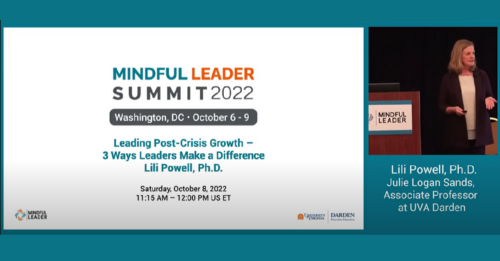Leading Post-Crisis Growth – 3 Ways Leaders Make a Difference

A thought-provoking session at the 2022 Mindful Leader Summit led by Lili Powell, Ph.D., explored the role of resilience and attunement in leadership. This article delves into the insights shared during this session, highlighting the profound impact of leadership on guiding individuals and teams toward growth in the aftermath of adversity.
Why Resilience Matters
The central question addressed during the session was, "Why do some individuals thrive and grow after facing adversity, while others become immobilized in their struggles?" This question has intrigued researchers for years, particularly when examining the varying responses to traumatic events such as combat, loss, or grief. Some develop conditions like PTSD or depression, while others emerge from these trials even stronger. Lili Powell acknowledged that multiple factors influence these outcomes, including pre-existing health conditions and personality traits. However, the primary focus was on the role of social relationships and leadership in bolstering resilience and fostering growth.
Attunement: Key to Leadership Resilience
At the heart of the discussion was the concept of attunement. Attunement is the ability to connect with oneself, others, and the situation. Leaders who possess strong attunement skills are better equipped to navigate challenging scenarios and provide vital support to their teams. This ability to accurately perceive reality and offer hope even in the face of adversity can significantly impact an individual's resilience.
Leaders as Resilience Influencers
The presentation stressed that leaders can influence the resilience of their teams by being exemplars of resilience themselves. Leaders who effectively manage their emotions and display resilience can have a positive impact on their team's overall well-being. Furthermore, it was noted that specific leadership behaviors linked to post-traumatic growth can mitigate the relationship between traumatic experiences and conditions like PTSD.
Promoting Growth Through Authentic Communication
A critical aspect of fostering resilience and growth is authentic communication. Leaders should engage in conversations that promote sense-making, benefit-finding, and the discovery of personal strength. By posing powerful questions, leaders can assist team members in reflecting on their experiences and identifying new possibilities for growth.
Contributions from the Audience
The audience added valuable insights during the discussion. They emphasized the power of storytelling, creating safe spaces for open dialogue, offering permission and choice, and promoting a "begin again" mindset. They highlighted that leadership involves not only personal resilience but also the support and nurturing of resilience in others.
Broadening the Leadership Repertoire
Leaders, particularly founders and executives, were encouraged to expand their leadership repertoire. While authenticity is vital, leaders must also develop discernment to choose the right approach for different situations. This involves balancing vulnerability with power dynamics and considering the best way to lead effectively.
Final Thoughts
In summary, the 2022 Mindful Leader Summit session shed light on the importance of resilience, attunement, and authentic leadership in fostering growth and recovery after adversity. It underlined that leadership extends beyond personal resilience and involves creating an environment that promotes personal and collective growth. Leaders, exemplified by Lili Powell, play a vital role in guiding individuals and teams toward resilience and post-traumatic growth, making it a crucial aspect of their leadership journey.
Want to see more insightful talks from Mindful Leader? Visit our YouTube page to watch more and make sure to subscribe so you never miss a new one!

0 comments
Leave a comment